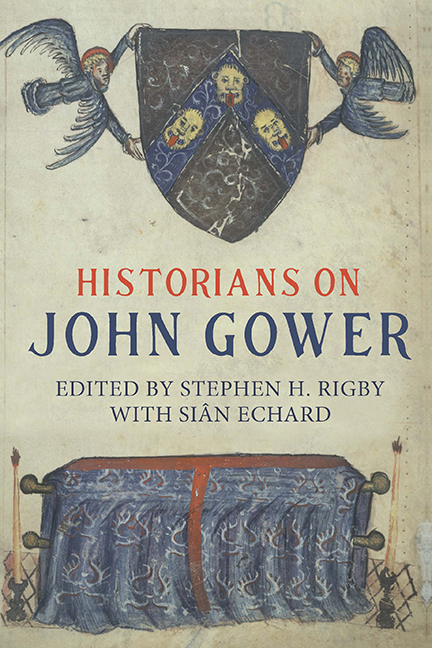Book contents
- Frontmatter
- Dedication
- Contents
- List of Illustrations
- Notes on Editors and Contributors
- Acknowledgements
- List of Abbreviations
- A Note on the References
- Preface: Gower in Context
- PART I Gower’s Life and Works
- PART II GOWER AND LAY SOCIETY
- PART III GOWER AND THE CHURCH
- PART IV GOWER AND GENDER
- PART V GOWER AND POLITICS
- PART VI GOWER AND COSMOGRAPHY
- Select Bibliography
- Index
- VOLUMES ALREADY PUBLISHED
1 - Gower’s Life
Published online by Cambridge University Press: 26 May 2022
- Frontmatter
- Dedication
- Contents
- List of Illustrations
- Notes on Editors and Contributors
- Acknowledgements
- List of Abbreviations
- A Note on the References
- Preface: Gower in Context
- PART I Gower’s Life and Works
- PART II GOWER AND LAY SOCIETY
- PART III GOWER AND THE CHURCH
- PART IV GOWER AND GENDER
- PART V GOWER AND POLITICS
- PART VI GOWER AND COSMOGRAPHY
- Select Bibliography
- Index
- VOLUMES ALREADY PUBLISHED
Summary
Although John Gower was wealthy and long-lived, and was a celebrated poet with ties to the royal court, his life has been something of a mystery. His parentage, date of birth, place of upbringing, education, and professional occupation(s) – if any – are unknown, and his only documented residence is the house in the Augustinian priory of St Mary Overy in Southwark, across the river from London, where he married Agnes Groundolf in 1398, and where the couple probably lived until Gower's death in 1408.
In Chapter 2, below, Stephen Rigby outlines the chronology of Gower's works and discusses what they reveal about the poet's connections with Richard II (r. 1377–99), Henry Bolingbroke (as Henry IV, r. 1399–1413), and other associates such as Geoffrey Chaucer (d. 1400). Gower's poetry, however, reveals little about his personal life. In Mirour de l’Omme there are hints of a possible legal career (see Anthony Musson, below, pp. 218–26) and a possible marriage; in Est Amor, he writes plainly of his imminent marriage late in life. Elsewhere, Gower writes explicitly of his physical woes and laments the miseries of old age and failing vision. Thus, in the original Prologue to Confessio Amantis, completed about 1390, he says that he has long been ill (lines 79–80*); a decade later, in the Latin verse dedication to Thomas Arundel, archbishop of Canterbury, which Gower wrote for a presentation copy of Vox Clamantis, he describes himself as old, blind, sick, bent with age, and wretched. Gower makes similar remarks in the poem Quicquid Homo Scribat, where he dates his blindness to the first or second year of the reign of Henry IV (r. 1399–1413). Nevertheless, he continued at least for a time to compose new works, including the very poems in which he lamented his blindness. In the autumn of 1392 Gower was vigorous enough to make a journey to York, and in Michaelmas term 1399 he appeared in person as a plaintiff in lawsuits in the court of Common Pleas at Westminster. He was still writing in March 1402, since his poem Presul Ouile Regis, evidently addressed to Archbishop Arundel, described a comet that appeared in that month.
Gower's life-records have been studied by a number of scholars, including Nicholas Harris Nicolas (1828), George Macaulay (1902), John Fisher (1959 and 1965), and John Hines, Nathalie Cohen and Simon Roffey (2004). Recent archival investigations by Graham Dawson, Sebastian Sobecki, and myself have identified additional sources.
- Type
- Chapter
- Information
- Historians on John Gower , pp. 23 - 120Publisher: Boydell & BrewerPrint publication year: 2019

